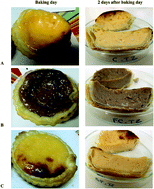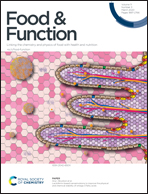Castanea sativa male flower extracts as an alternative additive in the Portuguese pastry delicacy “pastel de nata”
Abstract
Replacing artificial additives by natural compounds is a current trend in the food industry. In addition to their preserving effect, naturally obtained ingredients often exhibit important levels of bioactivities. Generally, plant species represent better sources of natural ingredients, since their compounds are less prone to causing unpleasant taste or odour. Chestnut male flower (CMF) was reported to have high antioxidant and antimicrobial activities. Hence, it was tested as an alternative to potassium sorbate in the most treasured Portuguese delicacy: “pastel de nata”. Different nutritional, chemical, physical and bioactive parameters were compared in two different periods: baking day and two days after baking. All samples presented similar nutritional and chemical profiles, but those added with CMF revealed higher contents of reducing agents and radical scavengers. Accordingly, the newly obtained formulation is expected to have better effects on consumers’ health, maintaining the chemical characteristics, besides rendering a novel, economically profitable, application to CMF.



 Please wait while we load your content...
Please wait while we load your content...